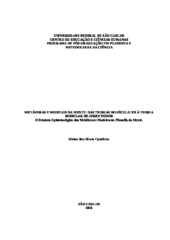| dc.contributor.author | Candiotto, Kleber Bez Birolo | |
| dc.date.accessioned | 2016-06-02T20:12:12Z | |
| dc.date.available | 2008-07-23 | |
| dc.date.available | 2016-06-02T20:12:12Z | |
| dc.date.issued | 2008-05-19 | |
| dc.identifier.citation | CANDIOTTO, Kleber Bez Birolo. Metáforas e modelos da mente: das teorias do século XX
à teoria modular de Jerry Fodor. 2008. 245 f. Tese (Doutorado em Ciências Humanas) - Universidade Federal de São Carlos, São Carlos, 2008. | por |
| dc.identifier.uri | https://repositorio.ufscar.br/handle/ufscar/4754 | |
| dc.description.abstract | The aim of this research is to present a discussion and an analysis of the epistemological statute of the main theories regarding the philosophy of mind. In order to do that, we have developed some basic notions of the scientific investigation theory to determine the degree of assurance, certainty and scientificity that go with some of the descriptions, metaphors, models and theories concerning the philosophy of mind. After that, we organized an itinerary of the main models and metaphors in mind research, from the birth of 19th century Psychology to the Cognitive Sciences of the last three decades. We have identified the alternance criteria regarding the metaphors and models that have been used in research about the mind. Then, we reached what we have called a triple dominion of models, which has been used along the 20th and in the beginning of the 21st centuries: the representational and information processing model, deriving from the Cognitive Sciences; the Cognitive Neuroscience, which resumes philosophical issues such as mind and intentionality; and the biological model, specifically the one concerning Evolutionist Psychology. We have tried to demonstrate the epistemological and methodological bases and the competences of this new dominion of models, as well as their limits and reach. In this way, we come to the thesis itself: the proposition that Jerry A. Fodor s representational and modular notion of the mind is a perspective that converges on such triple dominion. We understand that Fodor s contributions are basic for a research program in the philosophy of mind, considering that the program aims at defining methodological strategies and it also reviews essential epistemological issues. Regarding the discussions about the mind, Fodor emphasizes that psychology requires philosophical support and that there should be a flow of theses from psychology to philosophy as well; in this way, reductionist theories and conceptual illusions would be avoided. Fodor s epistemological contribution is a reference regarding the explanation of mental states, avoiding the proliferation of terms and notions. | eng |
| dc.format | application/pdf | por |
| dc.language | por | por |
| dc.publisher | Universidade Federal de São Carlos | por |
| dc.rights | Acesso Aberto | por |
| dc.subject | Filosofia da mente | por |
| dc.subject | Ciência cognitiva | por |
| dc.subject | Fodor, Jerry A. | por |
| dc.title | Metáforas e modelos da mente: das teorias do século XX à teoria modular de Jerry Fodor. O estatuto epistemológico das metáforas e modelos em filosofia da mente | por |
| dc.type | Tese | por |
| dc.contributor.advisor1 | Teixeira, João de Fernandes | |
| dc.contributor.advisor1Lattes | http://lattes.cnpq.br/8864985279295912 | por |
| dc.description.resumo | A pesquisa é uma discussão e uma análise do estatuto epistemológico das principais elaborações teóricas em filosofia da mente. Para isso, desenvolvemos algumas noções fundamentais da teoria da investigação científica para determinar o grau de segurança, certeza e cientificidade que acompanham algumas das descrições, metáforas, modelos e teorias em filosofia da mente. Organizamos, em seguida, um itinerário dos principais modelos e metáforas nas pesquisas sobre a mente desde o nascimento da Psicologia do século XIX até as Ciências Cognitivas das três últimas décadas. Identificamos os critérios de alternâncias na ciranda de metáforas e modelos que se revezaram nas pesquisas sobre a mente. Então, alcançamos o que denominamos de um triplo domínio de modelos que se instaurou ao longo do final do século XX e início do século XXI: o representacional e de processamento de informação, advindo das ciências cognitivas; a neurociência cognitiva, que retoma questões filosóficas como mente, intencionalidade; e o biológico, especificamente da psicologia evolucionista. Procuramos demonstrar os fundamentos epistemológicos, metodológicos e as competências deste novo domínio de modelos, assim como seus limites e alcances. E assim chegamos à tese propriamente dita: a proposição de que a noção representacional e modular de mente de Jerry A. Fodor é uma perspectiva para a qual converge tal triplo domínio. Entendemos que as contribuições de Fodor são fundamentais para um programa de pesquisa em filosofia da mente, uma vez que procura definir estratégias metodológicas e, também, rever questões epistemológicas essenciais. Referente às discussões sobre a mente, Fodor ressalta a necessidade de um apoio filosófico para a psicologia assim como um trânsito de teses da psicologia para a filosofia, o que evitaria teorias reducionistas e ilusões conceituais. A contribuição epistemológica de Fodor é uma referência na busca de explicações sobre os estados mentais que evitam a proliferação de termos e de noções. | por |
| dc.publisher.country | BR | por |
| dc.publisher.initials | UFSCar | por |
| dc.publisher.program | Programa de Pós-Graduação em Filosofia - PPGFil | por |
| dc.subject.cnpq | CIENCIAS HUMANAS::FILOSOFIA | por |
| dc.contributor.authorlattes | http://lattes.cnpq.br/3535420886883559 | por |
